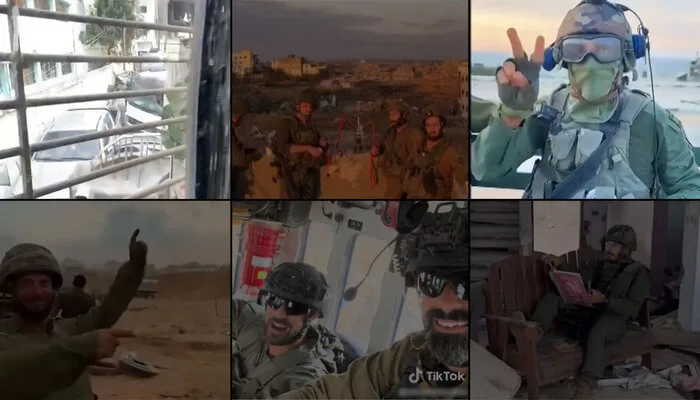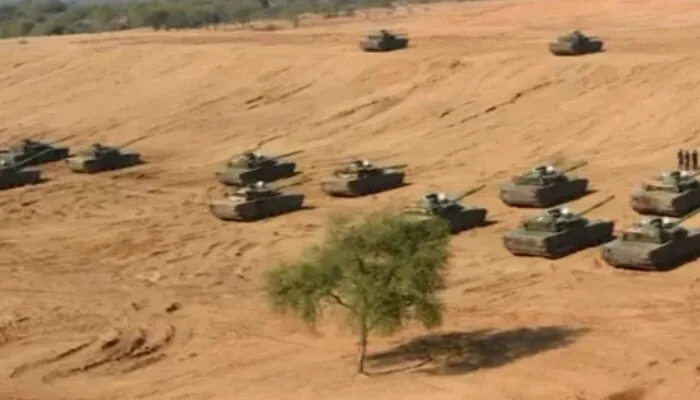
In a shocking revelation, an investigation by The New York Times has exposed dozens of videos shared by Israeli soldiers operating in Gaza. These clips, posted mostly on TikTok and Instagram, offer an unsanctioned and unsettling look into the destruction of civilian areas, the mocking of Palestinians, and the glorification of military actions that, according to experts, may violate international law.
Since Israel’s ground invasion of Gaza in October, soldiers have been posting videos online, often accompanied by militaristic anthems, jokes at Palestinians’ expense, and footage of bulldozers tearing through civilian property.
While some clips show mundane moments like soldiers eating or sending messages home, many others reveal troubling conduct that starkly contrasts with the official statements and policies of the Israel Defense Forces (IDF).
Capturing Destruction and Disregard
One particularly disturbing video shows a soldier driving a bulldozer down a battered street in Beit Lahia, Gaza, giving a thumbs-up to the camera. The caption chillingly reads:
“I stopped counting how many neighborhoods I’ve erased.”
These videos are not isolated. The Times reviewed hundreds of similar clips, tracing over 50 directly to Israel’s combat engineering units. Soldiers are seen vandalizing shops, destroying classrooms, and demolishing what appear to be civilian homes, greenhouses, and agricultural fields.
In one video, a soldier jokes as he lounges in the ruins of a Gazan house, pairing the footage with a parody song mocking Palestinians. Another shows soldiers toasting each other with glasses raised after blowing up residential buildings in Khan Younis.
Despite IDF regulations explicitly forbidding behavior that “affects the army’s image” or “harms human dignity,” these unsanctioned posts continue to flood social media platforms.
Read: Amnesty Accuses Israel of “Live-Streamed Genocide” in Gaza
Official Response and Global Outrage
Reacting to the findings, the Israeli military condemned the videos.
“The conduct emerging from the footage is deplorable and does not comply with army orders,” the IDF stated, adding that they were examining the circumstances.
Yet, despite these condemnations, new videos continue to surface, suggesting a broader problem with discipline and accountability on the ground. The footage has sparked outrage among human rights advocates and fueled accusations of war crimes at international forums.
In fact, several of these videos have already been submitted as evidence in South Africa’s genocide case against Israel at the International Court of Justice — a case Israel fiercely denies.
Social Media: A New Weapon in Modern Warfare
The growing role of social media in warfare has become undeniable. From Russia and Ukraine to Gaza, soldiers increasingly document the brutality of war themselves, sometimes unknowingly exposing violations of the Geneva Conventions.
Platforms like TikTok and Instagram initially allowed the spread of such videos but removed many after being contacted by The Times. TikTok representatives admitted the videos violated their hate speech and violent behavior policies. Meta, which owns Facebook and Instagram, did not respond.
Yet, by the time these platforms act, the damage — both to civilian dignity and the public image of military operations — has often already been done.
Evidence of Widespread Demolition
The scale of destruction in Gaza, captured in these videos, is staggering.
One soldier posted a photograph showing three armored bulldozers surrounded by flattened land where once greenhouses and homes stood.
“This is after a lot of work — the whole place was covered in greenery and houses until we got there,” his caption read.
Satellite imagery backs these claims. The Times verified that at least 63 structures near Israeli bases had been cleared within a few months. Combat engineers were often seen in videos using heavy machinery to systematically destroy civilian property — actions that legal experts argue could constitute unlawful destruction under international law.
While the IDF insists that demolitions target only buildings posing a “military threat,” critics argue that the sheer scope and nature of destruction suggests otherwise.
Mockery, Dedications, and “Genocidal Speech”
Beyond the physical destruction, the psychological toll inflicted through soldiers’ mocking behavior has also come under scrutiny.
In one video, soldiers dedicate the bulldozing of a Gazan house to Israeli pop star Eyal Golan, who has publicly called for Gaza’s destruction.
“This house is for you, Eyal Golan!” they shout gleefully.
Such videos, cited by South Africa at the ICJ, may represent not just violations of conduct but potential evidence of “genocidal intent,” according to international legal experts.
Dr. John B. Quigley of Ohio State University noted,
“The scale of residential destruction indicates the IDF is disregarding international laws protecting civilian property.”
Humanitarian Voices Speak Out
Basel al-Sourani, a human rights lawyer with the Palestinian Centre for Human Rights, described the videos as a devastating reminder of the human cost of the conflict.
“It’s heartbreaking, inhumane,” he told The Times.
“The Israelis want you basically out of your home, out of the Gaza Strip.”
His words echo the growing fears among Palestinians and international observers that the war’s real goal extends beyond defeating Hamas — potentially aiming at large-scale displacement of Gaza’s population.
Conclusion: A Brutal Reality Exposed
The New York Times analysis reveals an uncomfortable truth: social media has made it impossible to fully sanitize war narratives. The soldiers’ own smartphones have exposed actions that official reports and press briefings often overlook or deny.
As Gaza’s devastation continues, these videos serve as both evidence and indictment — a chilling testament to how easily human dignity can be trampled in times of war.
International scrutiny is mounting, but whether justice will follow remains uncertain.
Follow us on Google News, Instagram, YouTube, Facebook,Whats App, and TikTok for latest updates












